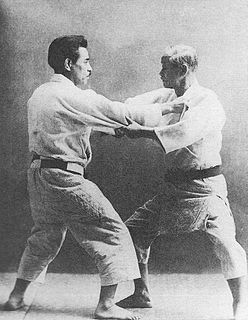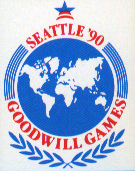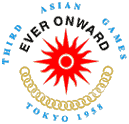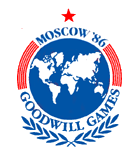
Judo was one of the sports at the quadrennial Goodwill Games competition. Judo competitions were held at three of the five Goodwill Games, with it featuring for a final time at the Games in 1994.

Judo was one of the sports at the quadrennial Goodwill Games competition. Judo competitions were held at three of the five Goodwill Games, with it featuring for a final time at the Games in 1994.
| Games | Year | Host city | Host country |
|---|---|---|---|
| I | 1986 | Moscow | |
| II | 1990 | Seattle, Washington | |
| III | 1994 | Saint Petersburg |

Judo is generally categorized as a modern Japanese martial art, which has since evolved into an Olympic event. The sport was created in 1882 by Jigoro Kano (嘉納治五郎) as a physical, mental, and moral pedagogy in Japan. With its origins coming from jujutsu, judo's most prominent feature is its competitive element, where the objective is to either throw or take down an opponent to the ground, immobilize or otherwise subdue an opponent with a pin, or force an opponent to submit with a joint lock or a choke. Strikes and thrusts by hands and feet as well as weapons defences are a part of judo, but only in pre-arranged forms and are not allowed in judo competition or free practice. It was also referred to as Kanō Jiu-Jitsu until the introduction to the Olympic event. A judo practitioner is called a "judoka", and the judo uniform is called "judogi".

The Goodwill Games were an international sports competition created by Ted Turner in reaction to the political troubles surrounding the Olympic Games of the 1980s. In 1979, the Soviet invasion of Afghanistan caused the United States and other Western countries to boycott the 1980 Summer Olympics in Moscow, an act reciprocated when the Soviet Union and other Eastern Bloc countries boycotted the 1984 Summer Olympics in Los Angeles.

The Judo competition at the 1984 Summer Olympics continued the seven weight classes first used at the 1980 Games. With the open division, there were eight competitions. Japan returned to the top of the medal count, after boycotting the Moscow games. Because of the Soviet-led boycott of the Los Angeles games, several traditionally strong judo countries, including Cuba and the Soviet Union, did not participate. The Judo competition was held at California State University, Los Angeles.

The 1958 Asian Games, officially the Third Asian Games and commonly known as Tokyo 1958, was a multi-sport event held in Tokyo, Japan, from 24 May to 1 June 1958. It was governed by the Asian Games Federation. A total of 1,820 athletes representing 20 Asian National Olympic Committees (NOCs) participated in the Games. The program featured competitions in 13 different sports encompassing 97 events, including four non-Olympic sports, judo, table tennis, tennis and volleyball. Four of these competition sports – field hockey, table tennis, tennis and volleyball – were introduced for the first time in the Asian Games.

The Judo competition at the 1988 Summer Olympics continued the seven weight classes first used at the 1980 Games. The open division was eliminated from the competition. Women's judo made its first appearance at the Olympic Games, as a demonstration sport. Japan failed to claim the top of the medal count for the first time in an Olympics in which they participated, coming in third behind South Korea and Poland.
James A. Pedro is an American retired World Championship and Olympic judo competitor and current judo coach. Pedro currently holds a 7th degree black belt in judo. He is the coach of Kayla Harrison, the first American ever to win an Olympic gold medal in judo.

The Druzhba Multipurpose Arena is an indoor arena in Moscow, Russia, part of the Luzhniki Sports Complex. It was built in 1979, and the first competition held there was the finals of the 7th USSR Summer Spartakiad. It hosted volleyball preliminaries of the 1980 Summer Olympics and was a venue of the 1986 Goodwill Games. The capacity of the arena is for 3,500 people and is the regular home venue of WVC Dynamo Moscow Volleyball team.
Yoon Dong-Sik, often anglicised to Dong-Sik Yoon, is a South Korean judoka, and mixed martial artist.
Kim Hyuk is a South Korean judoka. He won a gold medal in the lightweight (65 kg) division at the 1997 World Judo Championships in Paris. In 1994, Kim won five international competitions including Paris Open, the Asian Games in Hiroshima, Japan and the Goodwill Games in St. Petersburg, Russia.

The 1986 Goodwill Games was the inaugural edition of the international multi-sport event created by Ted Turner, which was held from 5 – 20 July 1986. The main stadium was the Central Lenin Stadium in Moscow, Russian SFSR, Soviet Union. The Games were a response to the Olympic boycotts of the period, which saw the United States refuse to attend the 1980 Olympic Games in Moscow, and the Soviet Union refusing to attend the 1984 Summer Olympics in Los Angeles. The Soviet athletes dominated the competition, winning 118 gold medals and 241 medals overall. The United States finished second place, with 42 golds and 142 medals in total.
The Judo competition in the 1986 Goodwill Games were held in Moscow, Soviet Union from 17 to 21 July 1986.
The Judo competition in the 1990 Goodwill Games were held in Seattle, United States 3 and 3 August 1990.
The Judo competition in the 1994 Goodwill Games were held in Saint Petersburg, Russia 26 July 1994.
Athletics was one of the sports at the quadrennial Goodwill Games competition. Athletics competitions were held at every one of the five Goodwill Games. The final athletics events were held at the Games in 2001 as the 2005 edition of the Games were cancelled.

The 2001 Goodwill Games was the fifth and final edition of the international multi-sport event. The competition was held in Brisbane, Queensland, Australia from 29 August to 9 September 2001. A total around 1300 athletes took part in 14 sporting competitions.

At the 1986 Goodwill Games, the athletics competition was held in July 1986 at the Olympic Stadium in Moscow, Soviet Union. A total of 42 events were contested, of which 23 by male and 19 by female athletes.

At the 1990 Goodwill Games, the athletics events were held in Seattle, Washington, United States between July 22 and 26, 1990. A total of 43 events were contested, of which 23 by male and 20 by female athletes. Athletes from the United States and the Soviet Union dominated the competition as they had done in the inaugural edition, with United States coming out on top this time with 54 medal won, 20 of them gold. The Soviet Union was a clear second place with 14 golds and 43 medals in total. The Greater Antillean island nations of Cuba and Jamaica had the third- and fourth-greatest medal hauls, respectively.

At the 1994 Goodwill Games, the athletics events were held in July at the Petrovsky Stadium in Saint Petersburg, Russia. A total of 44 events were contested, of which 22 were by male and 22 by female athletes. The marathon event was dropped for the 1994 edition and racewalking events took place on the track, making the entire athletics programme a track and field-only affair. The United States won the most gold medals (18) in the athletics competition, but Russia had the greatest total medal haul, winning 41 medals, 10 of which were gold. Cuba, Great Britain and Kenya were the next best achievers in the medal count.
The IBSA European Judo Championships is an event organized by the International Blind Sports Federation (IBSA). It is a judo competition for visually impaired athletes. Organised biennially, the competition is not run during years when the IBSA World Judo Championships or Summer Paralympics are contested.
The IBSA World Games or World Blind Games are an international multi-sport event, occurring every four years, organized by the International Blind Sports Federation (IBSA). The events enable blind and partially sighted athletes to compete in a number of sports. The first event took place at Madrid, Spain in 1998.